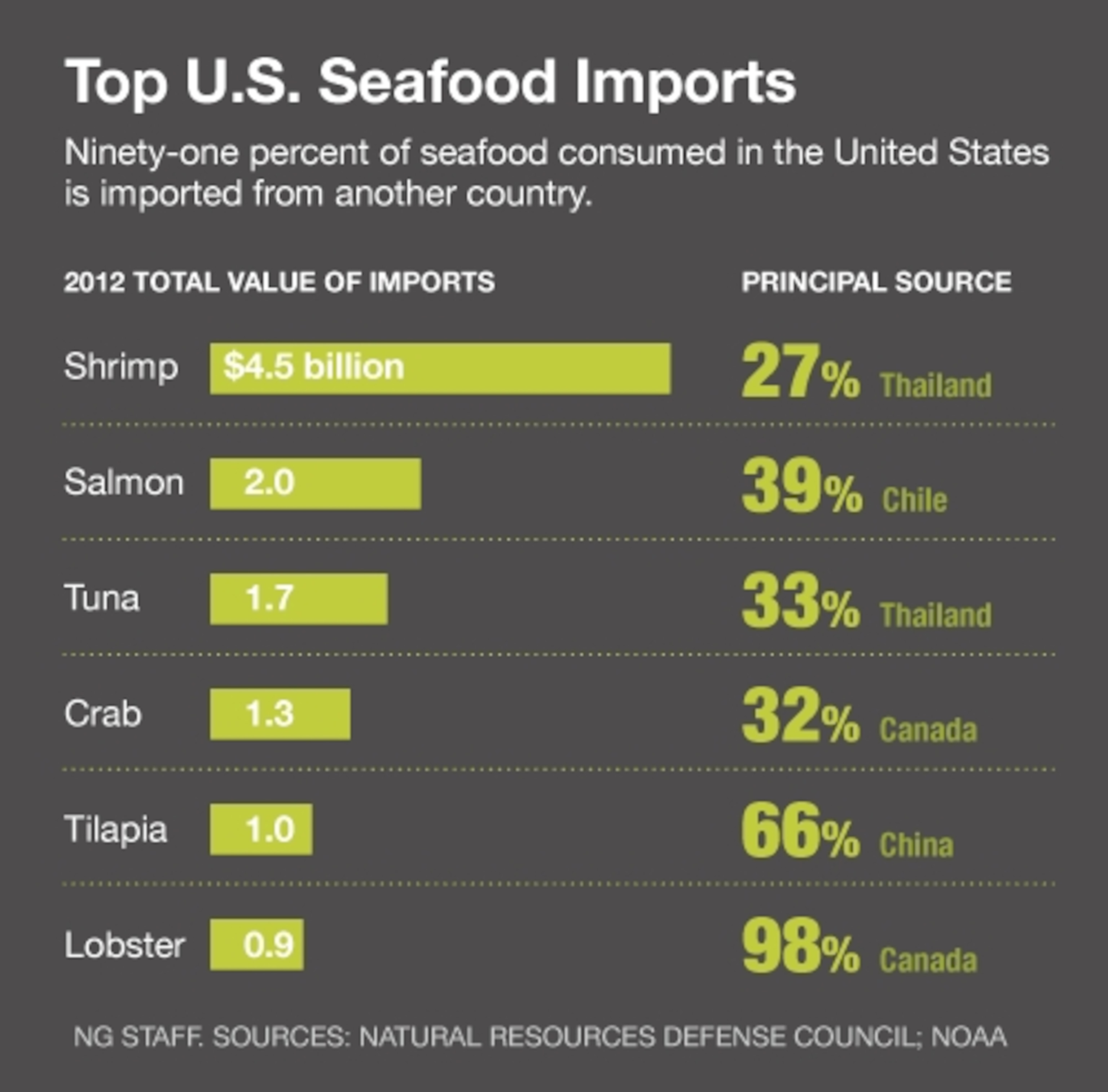
Foreign Fisheries Contribute to Marine Mammal Deaths
Imported fish doesn't meet the same safety standards as domestic catches, says environmental group.
There's something fishy in U.S. seafood, suggests a report finding that methods used in foreign fisheries contribute heavily to deaths of marine mammals such as seals, dolphins, and whales.
"Net Loss: The Killing of Marine Mammals in Foreign Fisheries," the report from the Natural Resources Defense Council (NRDC) conservation group, suggests that more than 650,000 marine mammals are killed or seriously injured every year—trapped or entangled by illegal nets or longline hooks—in foreign fisheries.
A lot of the foreign fish ends up eaten by domestic seafood fans. "The U.S. is importing more than 91 percent of all seafood it consumes, half of that being wild-caught," says NRDC report author Zak Smith. "So it can make a difference in the global market."
While worldwide fishing data are inadequate to ascertain exactly what percentage of the 650,000 excess marine deaths is directly related to imported seafood, the report argues that the U.S. market has a substantial impact, given its size.
Whales, Dolphins, and Seals
The marine mammals at risk include the Mediterranean sperm whale, the Indian Ocean's spinner dolphin, and the New Zealand sea lion, according to the report. Fisheries that put such animals in peril are found everywhere from Canada to Sri Lanka, and regulations designed to prevent "bycatch" deaths during fishing for seafood species vary widely, notes the report.
"Bycatch is the single most important threat to marine mammals, and threatens some species with extinction," said marine biologist Andrew Read of Duke University, who was not a report author. He pointed to North Atlantic right whales and vaquitas, the world's smallest porpoises, which are barely hanging on in Mexico's Sea of Cortez, as two species that are particularly at risk from fisheries.
"It's also an animal welfare issue, because large whales can also trail [fishing] gear for years, so the animals can suffer for long periods of time," said Read.
Outlaw Fishing
Most tragic, according to Smith, is that the U.S. Marine Mammal Protection Act bars the importing of fish caught using methods that don't include mammal protection measures such as release nets and safer hooks. "But unfortunately this law has never been enforced in its 40 years," said Smith.
Connie Barclay, a National Oceanic and Atmospheric Administration (NOAA) Fisheries spokesperson for the Office of Law Enforcement, the agency that oversees U.S. fishing, told National Geographic that since the Marine Mammal Protection Act was enacted in 1972, the agency has had officers and agents conducting patrols and boarding vessels.
They "take appropriate action depending on the nature of the violation. Penalties can range from verbal warnings to fines and even prison time," she said, by email.
"We are committed to improving compliance through outreach and education with the fishing industry, as well as focused and effective criminal enforcement," Barclay added.
Nina Young, a foreign affairs specialist with NOAA Fisheries, told National Geographic that the agency is currently revising its regulations regarding imports of foreign fish, "to bring [imports] in line with what we're doing domestically."
The new rules should be released in draft form within the next six months, she said, followed by a public comment period.

Leveling the Playing Field
Acy Cooper, Jr., a longtime fisherman and the vice president of the Louisiana Shrimp Association, said he supports NRDC's call for the U.S. government to step up enforcement of fish imports.
"We need a level playing field, or we will lose this industry," Cooper said, noting that fish prices have been depressed for years—thanks to imports from countries that haven't had to follow the same strict protections for marine mammals.
American shrimp fishers, for example, must use bycatch-excluder devices to help marine mammals escape nets, Cooper said. Those devices cost $400 to $500 each, and a typical shrimp boat has three to four of them. "We also lose some of our catch because of them, so it raises our cost," said Cooper.
"They can catch them for a lot cheaper, put them on our market, and drive our prices down," he said of foreign shrimp fisheries, which are especially prevalent in Southeast Asia. "We can't continue on this trend."
Smith said the U.S. government should require foreign fisheries to prove that they are "moving toward zero bycatch tolerance," just like domestic fisheries.
Young reiterated that the first goal in reducing bycatch in domestic fisheries is to reduce it "to a sustainable level, in which marine mammal populations can recover." Then, in the future, the "zero mortality target kicks in," meaning no marine mammals would be killed by fishing activities.
Barclay said the goal of revising NOAA's imported fish rules is to "provide some level of equality for the 122 nations that are our trading partners." She added that having to cover such a large number of countries "makes the rule complicated," and that enforcement will involve numerous government agencies.
Young said that NRDC's estimate of total marine mammal deaths through bycatch relied on self-reporting, as many countries don't keep good records of bycatch. She said she hopes revising U.S. law will encourage countries to improve their reporting.
Many of the bycatch deaths happen in "artisanal fisheries" (whose fish are consumed locally), especially those that use gill nets, Young said. "We have no leverage with artisanal fisheries, so this [future] rule, while a tool that will have tremendous conservation benefits, is not a panacea," she said.
Young added that there already have been situations in which the U.S. Marine Mammal Protection Act has helped bring about change in other countries. As one example, she said NOAA recently petitioned Chilean fisheries to stop using marine mammals as bait. "Within a year, with bilateral discussions, we solved that issue, so it's a powerful tool," she said.
Wild vs. Farmed
"Consumers have role[s] to play: One is [an] activist [role] and one is as consumers," Smith said. "We hope people will join us to urge enforcement, and until then we can vote with our dollars and only purchase American wild-caught seafood."
Asked whether the new report suggests consumers may want to opt for farmed seafood over wild-caught, Smith said his work did not attempt to address that question. He added, "There is a lot of controversy surrounding certain farmed fisheries."
Cooper pointed out that some fish farmers use antibiotics and hormones, which he said could negatively impact the environment.
The advocacy group Food and Water Watch has criticized fish farms for creating pollution, negatively impacting habitats, allowing fish to escape and spread diseases or unnatural genes to wild populations, and requiring large inputs of food (which in the case of predatory fish is often sourced from other ocean-caught fish).
Smith said half of U.S. seafood is still supplied from the wild, and argued that "there isn't capacity for all that to switch over to farmed. When you have a choice of wild-caught fish, then make smart choices. We have a vibrant wild-caught industry, and it can continue if we sustainably manage it."
To learn more about sustainable seafood, check out National Geographic's seafood decision guide